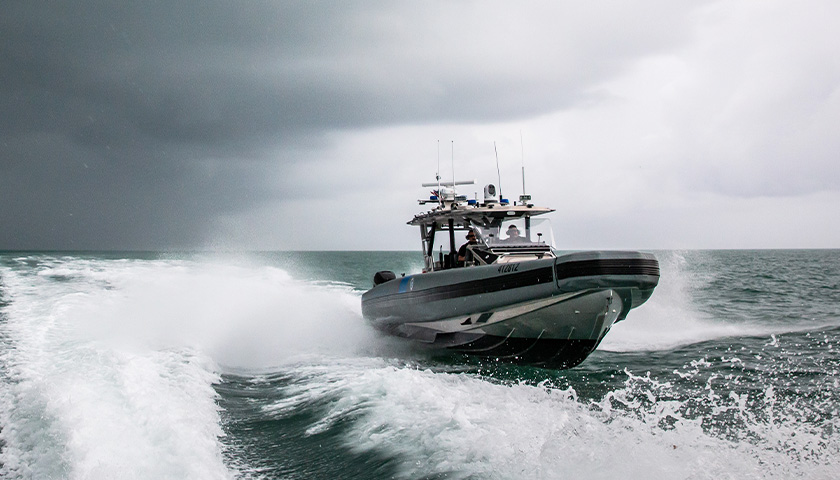by Bethany Blankley
In January, Border Patrol agents apprehended 1,402 foreign nationals illegally entering Florida, according to preliminary data obtained by The Center Square from a Border Patrol agent on condition of anonymity for fear of retaliation.
They also reported 58 gotaways, those who were known and reported to have illegally entered and got evaded capture by law enforcement. Combined, these totaled 1,460.
The sector also reported 2,083 turnbacks, those who attempted to enter illegally but were turned away, and 675 “outstanding,” meaning they didn’t have enough information to categorize the incidents of detected traffic they reported.
The January data is up from 1,399 apprehensions and 40 gotaways, previously reported by The Center Square last month.
It’s also slightly down from December, when Miami Sector Border Patrol agents apprehended a record 1,664 illegal foreign nationals and 107 gotaways, according to preliminary data obtained by The Center Square. The preliminary data excludes Office of Field Operations data.
The numbers continue to break records after the Miami Border Patrol Sector reported a significant increase in apprehensions over the last several months and a 500% increase in apprehensions in fiscal 2022 compared to fiscal 2021.
From Sept. 1, 2021, to October 31, 2022, Miami Sector Border Patrol agents apprehended 2,350 foreign nationals attempting to enter Florida illegally by sea. The majority were Cubans.
They also stopped 131 maritime smuggling events, a 330 percent increase from fiscal 2021, Miami Sector Chief Agent Walter Slosar said in December.
Border Patrol Chief Raul Ortiz announced on Feb. 1 that, since Oct. 1, 2022, Miami Sector agents had responded to 246 migrant landings and encountered over 4,400 migrants. He also said the sector increased personnel and worked with federal, state and local agencies to deter, detect and interdict illegal maritime attempts in Florida.
On February 9, Slosar issued an alert stating that “Border Patrol agents and law enforcement partners were responding to a migrant landing near Tavernier, Florida, involving a large number of individuals. There is an increased presence of law enforcement and first responders in the area.”
He later provided an update, stating that 114 Haitians had been apprehended and transferred to a local Border Patrol station for processing.
The day before, agents took into custody 26 Cubans after they made landfall in the Marquesas Keys, uninhabited islands west of Key West.
The day before, they responded to a smuggling event where they encountered 3 Chinese, one Haitian and two Dominican Republic nationals. The same day, U.S. Coast Guard officers interdicted a smuggling operation using a sailboat near Lake Worth and apprehended 23 Haitians.
Of those on the sailboat, one suspected smuggler was arrested and “will be prosecuted by U.S. Border Patrol and Homeland Security Investigations-Miami,” CBP AMO Regional Director SE announced.
On February 6, agents arrested a “Columbian national with a significant criminal history and an active arrest warrant in Texas for his involvement in organized crime related to theft and fraud,” Slosar said. He was turned over to local authorities for extradition.
On February 3, BP agents and law enforcement partners apprehended a group of 29 Cubans after they landed in the Florida Keys. The day before, they arrested 30 Cubans who landed at the Dry Tortugas National Park, including 19 adults and 11 juveniles.
Dry Tortugas National Park on January 2 temporarily closed and prohibited public access so law enforcement and medical personnel could deal with a group of 300 Cubans and others who’d arrived.
After 500 people were apprehended off Key West around New Year’s Eve and New Year’s Day, Gov. Ron DeSantis declared a state of emergency. He issued an executive order activating the National Guard and other state resources “to protect Floridians from the dangerous impacts of the Biden Border Crisis.”
Miami Sector agents, responsible for patrolling 1,200 miles of coastal border in Florida, regularly work with federal, state and local law enforcement agencies, including the Monroe County Sheriff’s Office, which has jurisdiction over the Florida Keys.
An influx of people has become “particularly burdensome for the Monroe County Sheriff’s Office,” DeSantis’ office said, which has 194 deputies and limited resources dedicated to providing public safety.
“The number of individuals attempting to come to the United States and unauthorized alien interdictions in and around Florida have risen to alarming levels not seen for decades,” DeSantis’ order states. Since last August, federal, state and local officials have interdicted more than 8,000 people in Florida’s territorial waters alone, he said.
– – –
Bethany Blankley is a regular contributor to The Center Square.
Photo “Air and Marine Operations” by U.S. Customs and Border Protection.








